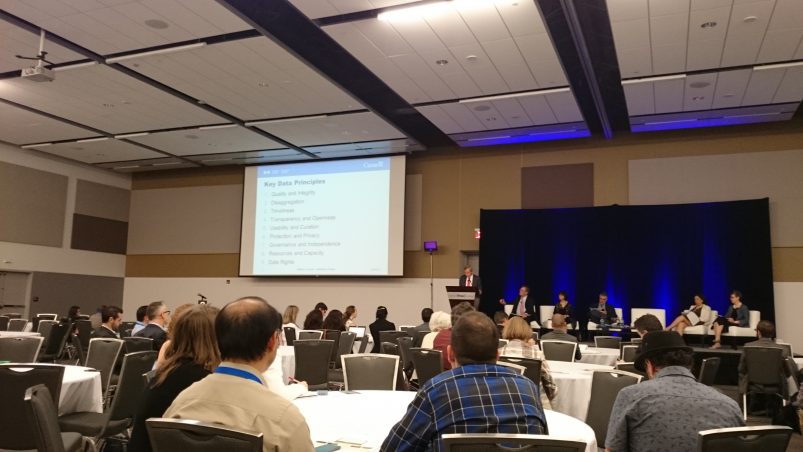By Suthee Sangiambut
This Friday saw the conclusion of the International Open Data Conference (IODC) 2015, with an atmosphere of optimism and celebration. Attendees came from all corners of the world in numbers far greater than previous conferences—one indication that the open data movement may be gaining momentum. On this final day, stories of open data implementation were shared from both the developed and developing world.
Friday’s panel emphasized questions that went beyond the release of data. A panel which included top officials from Canada, the United States, and the World Bank answered questions on how to break down data silos to ensure people can work together. Commonly referred to as open by default, the panelists felt data ownership needs to be discouraged so that more data ends up in this format.
In particular, they felt such a cultural shift within governments would allow for knowledge sharing with the publics they serve and within the state. Furthermore, it would produce efficiencies that are impossible under today’s paradigm of data produced by a single agency for its own use. Instead, interoperability needs to be technical (such as data formats and standards which would allow the combining of data from different departments), human (common nomenclature and processes to allow communication between departments), and legal (so issues of copyright and intellectual property do not prevent data sharing).
Amparo Ballivan, a lead economist at The World Bank, added that governments not only need more openness in data but that “openness in partnerships” is also desirable. In other words, our outreach and educational programmes to promote open data and data sharing must be as transparent as the data they seek to open up.
“We are called to display the same kind of behavior that we demand of others,” she said.
Catherine Woteki, under secretary for research, education & economics and chief scientist at the United States Department of Agriculture, proposed another solution for this challenge. In particular, she felt that a ‘thesaurus’ is needed to provide links between data-sets in different silos. She emphasized a problem-driven approach to releasing data, with priority given to sharing the data needed to address real problems that has the highest impact.
Throughout the conference, there was also discussion on the role of intermediaries or the non-profit or advocacy groups that promote the usage and availability of open data. Intermediaries were acknowledged as crucial in bridging digital and data divides, to bring open data and its benefits to those unaware or without the skills to leverage it. Intermediaries will also be important actors when attempting to capture local knowledge.
Panelists in other sessions felt that the private sector has become interested in opening up data. At a panel titled “Corporate data sharing for the public good: shades of open,” there was much discussion on the potential benefits of having the private sector open up their data to the public. Potential first steps to be taken were: regulatory frameworks, connecting practitioners, and creating tangible use cases.
The day ended with a recap of the conference, hosted by David Eaves. Key points included: the move beyond engagement through hackathons, moving beyond simply releasing data on portals towards addressing impacts, and general inequalities such as digital divides. On the subject of intermediaries, it was noted that the public is still speaking mainly through intermediaries, resulting in a gap between the demand and supply sides for data. This gap needs to be bridged in order to meet people’s needs.
IODC 2016 will be hosted next year in Madrid, Spain. For web archives of the panels, visit the IODC 2015 website.
The Final take-home points:
- Citizen engagement needs to become a more sustained effort
- Standardization still needs to be pushed
- Measurement of outcomes and impacts need to be formalized
- ‘Open’ culture and ways of thinking need to be promoted in all sectors
- Data must move away from silos to become interoperable
- Intermediaries are important actors that help bridge gaps between demand and supply sides
- Problem-driven approaches to releasing open data should be encouraged
If you have thoughts or questions about this article, get in touch with Suthee Sangiambut, Geothink’s Newsletter Editor, at suthee.sangiambut@mail.mcgill.ca.

